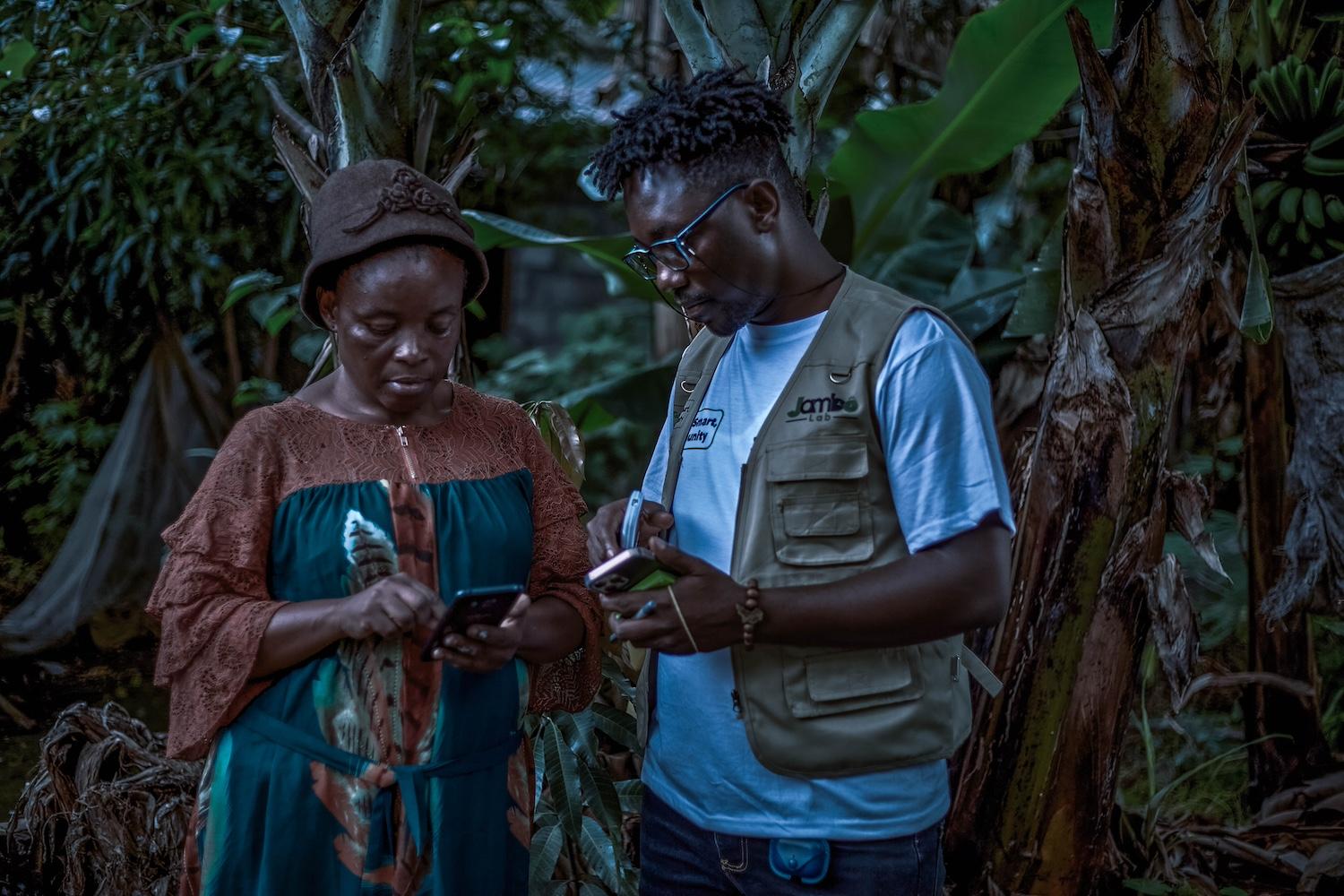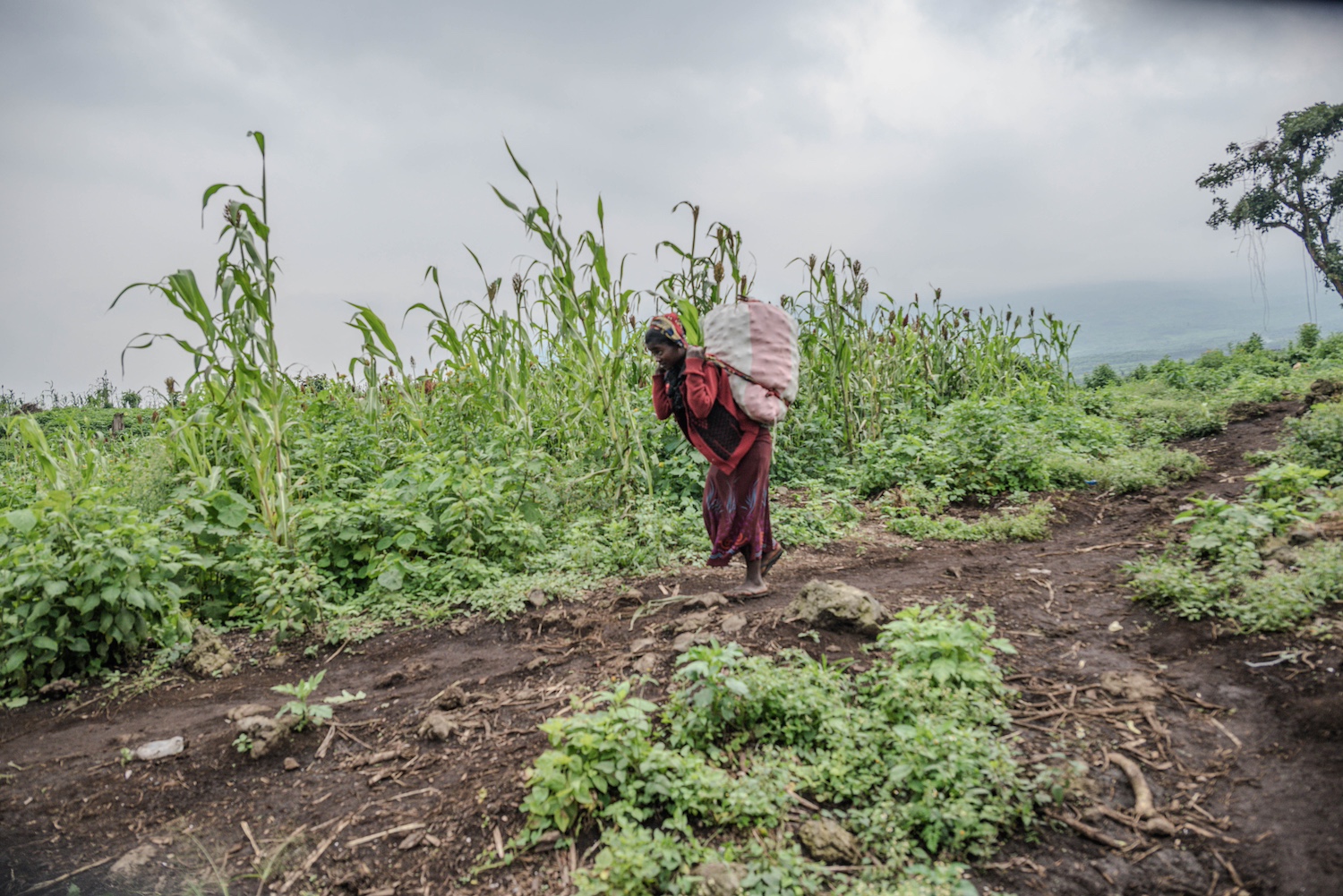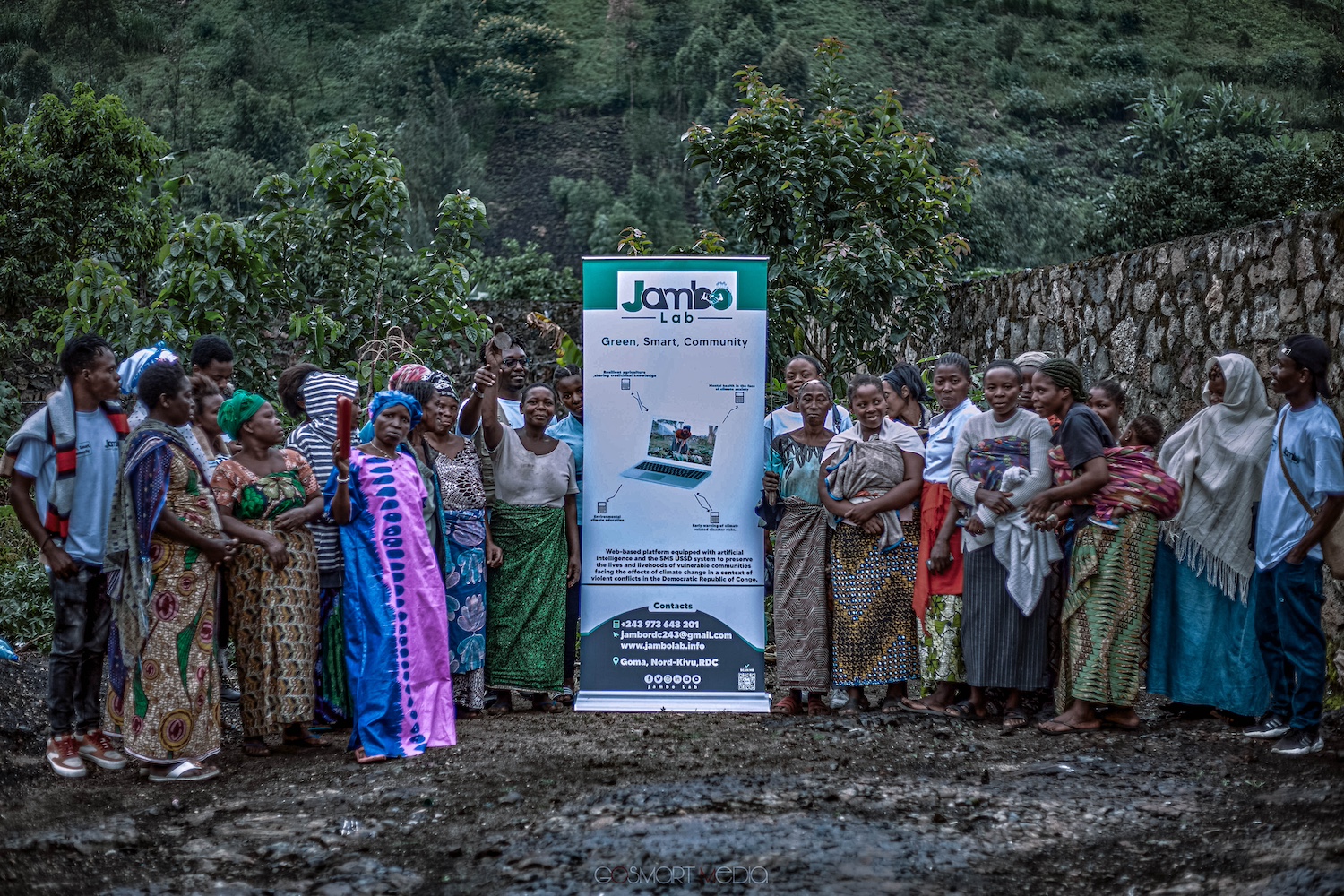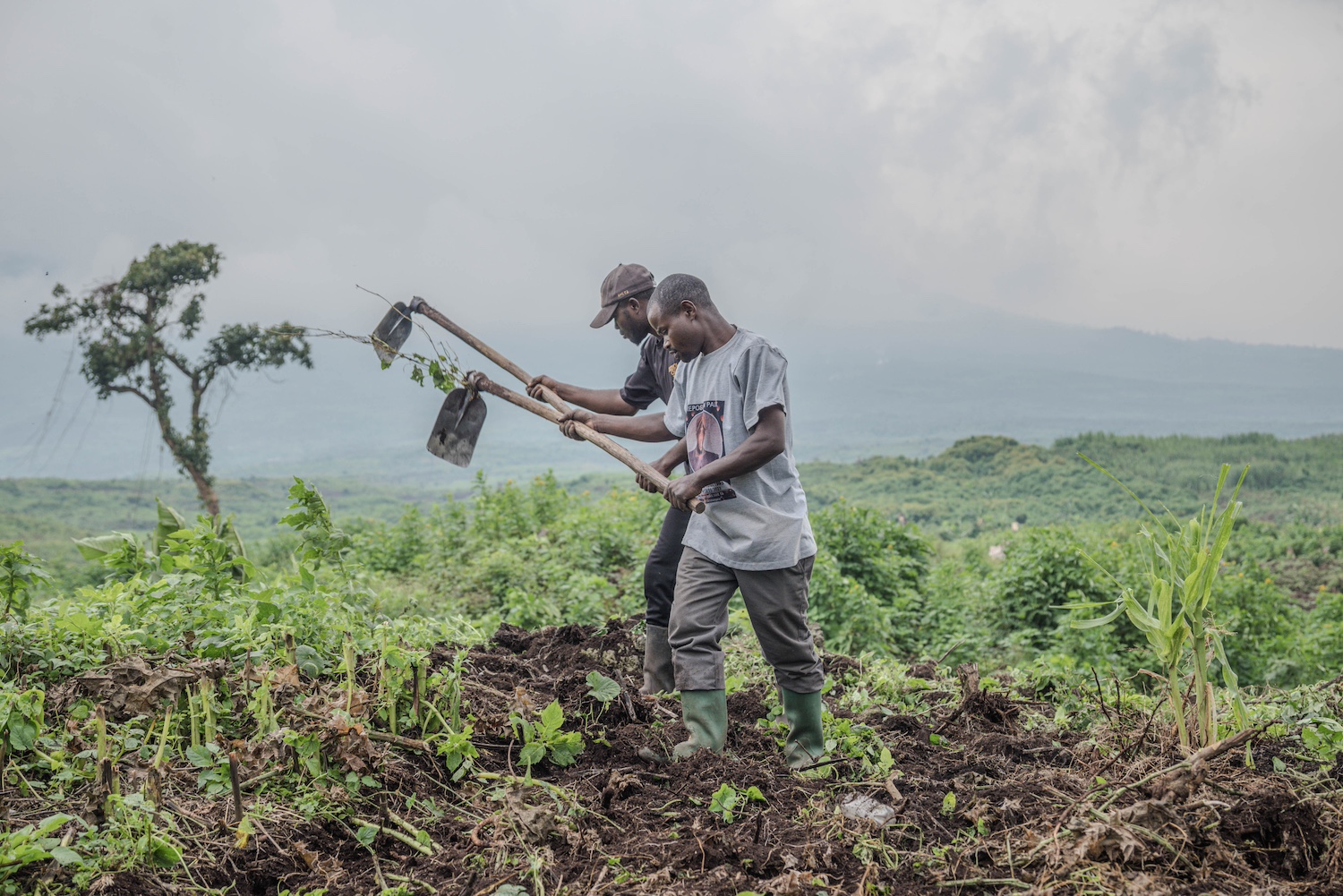
A team member from Jambo Lab, a SMS weather alert platform, teaches communities in the Democratic Republic of Congo about the system. (Image: Joseph Tsongo)
The text message arrived at dawn, just as Kavira Mwamini was preparing to tend her vegetable garden in Nyiragongo territory in the eastern Democratic Republic of Congo. “Mvua kubwa inakuja” — heavy rains are coming — it read. She looked up at the still-clear sky and smiled. For the first time in the two years she has taken up farming, she felt ready.
In this corner of eastern Congo, rain is both a lifeblood and a threat — unpredictable, unrelenting and often cruel. Some seasons, it arrives too early, washing away freshly planted seeds. Other years, it comes too late to rescue a withering crop. Occasionally, it blesses the land just in time.
On this April morning, the unexpected buzz on Mwamini’s phone was all that stood between her and financial ruin.
“Because of that warning, I was able to cover my seeds, reinforce the furrows, and even delay planting a bit,” she told TriplePundit. “The harvest wasn’t great, but at least I had one. Without that message, I would have lost everything again.”

In eastern Democratic Republic of Congo, where climate change and armed conflict have combined to create a perfect storm of vulnerability, small-scale farmers like Mwamini are struggling to hold onto their livelihoods. Yet her small victory reflects a growing grassroots effort across the region. In a place where government weather services have largely collapsed and farmers lack the tools to prepare for increasingly erratic conditions, a simple SMS weather alert — requiring no internet, no smartphones, not even literacy in French — is offering new hope.
That lifeline reaches over 3,000 farmers and displaced people across the region through a platform called Jambo Lab. Its founder, Joseph Tsongo, created the system in 2022 after watching his own community struggle with the same challenges now facing his users.
"I am first and foremost the son of a farmer," the 29-year-old activist said. "I grew up in war, and I have always witnessed the injustices suffered by local communities."
It was the suffering of rural populations and displaced people, caught at the intersection of climate change, armed conflict, and institutional neglect, that prompted him to start looking for a solution.
“The idea was to put technology at the service of the most disadvantaged,” Tsongo told TriplePundit. “With a simple phone, we can change someone’s life.”
The system is remarkably simple. Farmers text a short code (440440) to register for free alerts. Behind the scenes, artificial intelligence analyzes atmospheric conditions and generates real-time weather warnings. Once validated, these alerts are automatically sent as SMS messages in Swahili to subscribers' phones.
That was the case for Mwamini. The mother of seven never imagined she would become a farmer. When armed conflict reached her village of Biruma in Rutshuru territory after the resurgence of the M23 rebellion in 2021, she fled with her children to Goma, joining thousands of other displaced families seeking safety.
She ended up in Kanyaruchinya, a sprawling displacement camp less than 15 kilometers from Goma, in Nyiragongo territory. There, faced with the harsh reality of survival, Mwamini learned to farm.
"I had no choice," she said. "Humanitarian aid reaches us maybe once every three months, and it's never enough to feed seven children. I had to find another way."
With no agricultural background and little guidance on when to plant or which crops could withstand the region’s increasingly erratic weather, Mwamini cleared a small plot near the displacement camp and began experimenting with vegetables. More than once, her efforts failed because of unexpected and often destructive rain, leaving her unable to grow enough to feed her children.
The desperation that drove Mwamini and hundreds of other displaced people into farming stemmed from conflict, but it was the unforgiving shifts in the climate that repeatedly crushed their hopes of rebuilding a livelihood.
Honoré Chiraba, a meteorologist at the Goma Volcano Observatory, spent decades tracking the region’s shifting weather patterns and says the pace of change has only accelerated, making it even harder for vulnerable communities to adapt.
"Since 1971, average temperatures in Goma have risen by 2.3 degrees Celsius [4.14 degrees Fahrenheit]," he said. "That's enormous. This increase leads to intense rain. In less than an hour, you can get a month's worth of rainfall."
The consequences are devastating and widespread. In Nyiragongo territory, torrential rains between 2022 and 2023 alone devastated at least 20 hectares of farmland, affecting over 300 small-scale farmers. The extreme weather was compounded by deforestation, rapid urbanization and inadequate infrastructure.
"When you cut down all the trees, the water no longer infiltrates the soil," Chiraba said. "It runs off, washing everything away. Sheet metal buildings only make the runoff worse."
For Mwamini and many others, losing that gamble meant going hungry. So when Jambo Lab’s outreach team arrived in Kanyaruchinya to conduct awareness campaigns about climate alerts, she did not hesitate to sign up. The platform's guidance on what to grow during the rainy season and when to harvest became her lifeline, turning her desperate attempt at farming into a sustainable way to feed her family.

The urgency of platforms like Jambo Lab becomes clearer when considering what happened in nearby Kalehe territory in 2023. In early May, torrential rains triggered flash floods and landslides that buried entire villages, killing over 400 people and displacing more than 100,000. “There was no weather station. People weren’t warned,” Chiraba said.
Years of unchecked deforestation stripped the hillsides of their natural defenses, and with no early warning systems in place, residents had no chance to flee.
“It’s not just about weather data,” Chiraba said. “It’s about poverty, abandonment, and a complete lack of support for vulnerable communities from the government.”
For Tsongo, the road ahead is long. Jambo Lab is expanding its scope based on the evolving needs of the communities it serves, he said. In 2025, the platform broadened its mission beyond climate alerts to include drinking water access, water resource management and sanitation. Beneficiaries can now report broken pumps, water shortages, or hygiene issues via basic mobile phones, a form of community mobilization that feeds directly into public advocacy efforts, all without cost.
The platform's impact extends beyond farming. Kazungu Bahati, a young displaced farmer near Kanyaruchinya, fled fighting in Masisi and found himself trying to rebuild his life with nothing but an old Nokia phone.
"Here, we're trying to cultivate a field, but we have nothing. No radio, no news, nothing," he said. "But Jambo Lab is different. I receive messages on my old phone. It tells me when to avoid planting, or when to water more. It's in Swahili, so I understand."
For Bahati, the messages carry emotional weight beyond their practical value. "It gives us the feeling that we still matter," he said with a smile.

Despite the progress, Tsongo's team works without external funding or consistent support, often under the constant threat of violence that can shut down operations without warning. Security concerns forced field missions to be cancelled, cut communication with users in remote areas, and blocked expansion into conflict zones like Kalehe or Ituri. Limited resources also constrain the platform's ability to innovate or maintain existing services.
These same difficulties are also encountered by state efforts, such as the Goma Volcano Observatory meteorological service.
For Chiraba, the success of citizen-led initiatives raises uncomfortable questions about government responsibility. While he applauds innovation, he argued it is not enough to rely on volunteers and basic technology to address life-or-death climate risks.
"The state must take over," Chiraba said. "We need weather stations in every region, a communications network, and a real warning service. Without these, people will continue to die in the rain, in ignorance, even though simple solutions exist."
For the activists behind Jambo Lab, the platform works to restore agency in communities that have long been overlooked.
“Climate change is unjust,” Tsungo said. “It affects those who have contributed the least to its cause. We’re trying to give them at least one tool to resist, anticipate and defend themselves. And as long as we have a phone that picks up a signal, we will continue.”
This article is published in collaboration with Egab.

Anicet Kimonyo is a freelance multimedia journalist and fixer based in Goma, Eastern Democratic Republic of Congo, with deep expertise in the Great Lakes region. Specializing in conflict, human rights and environmental reporting.














